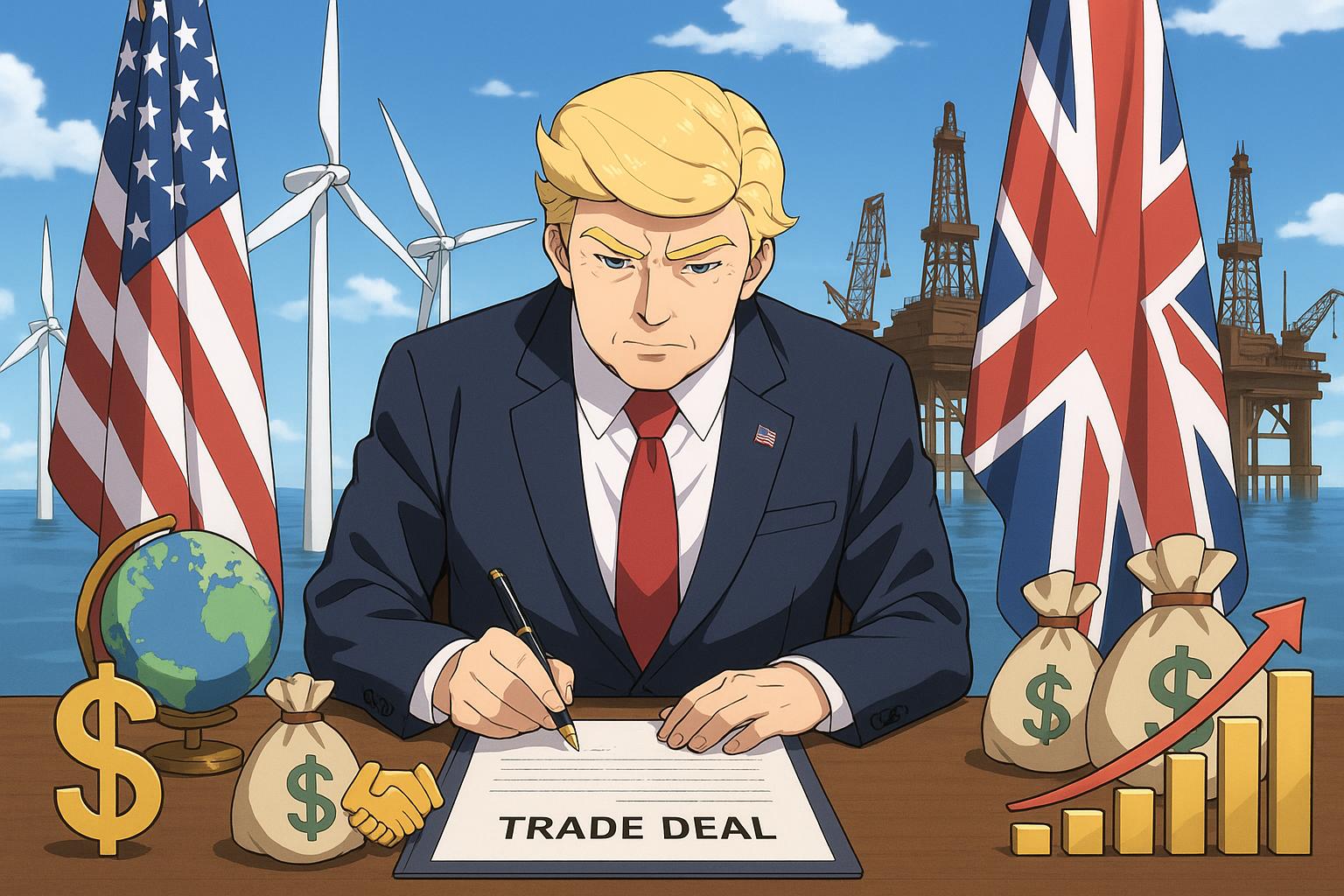President Donald Trump has announced a landmark trade deal with the United Kingdom, promoting it as the first in a series despite ongoing tariff controversies and diverging energy policies—an agreement seen as crucial in efforts to stabilise his declining approval ratings amid economic uncertainty.
President Donald Trump has recently announced a significant trade deal with the United Kingdom, marking what he describes as “the first of many” agreements to come. This announcement comes on the heels of a controversial imposition of substantial tariffs on various nations, which the president argues is part of a strategy to recalibrate international trade relations. In his declaration, Trump insisted, “This is a very big deal…this is a maxed-out deal that we’re going to make bigger,” casting the agreement as substantial despite other commentators framing it as an initial pact necessitating further negotiations.
Financial markets seemed to respond positively to the news, with stock indices experiencing notable gains. The S&P 500 saw an increase of 1%, while the Dow Jones Industrial Average rose by 408 points, reflecting investor optimism about the benefits of enhanced market access mandated by the deal. The agreement is particularly favourable for U.S. agricultural exports, as it aims to eliminate non-tariff barriers that American products have historically faced within the UK market.
In the broader political context, however, the ramifications of this deal could be more complex. Trump’s approval ratings have dipped in recent weeks, with public concern increasingly focused on economic issues and inflation—a sentiment that considerably affected his predecessor, Joe Biden. As of the latest polling, Trump’s approval rating has plunged to around 42%, a decline linked directly to his handling of economic matters, including his aggressive tariff policies, which have sparked fears of a recession.
Veteran Republican strategist Ryan Williams addressed the political implications of the trade deal, describing it as a “positive first step.” He advised that Trump’s approval ratings are intrinsically tied to economic performance, suggesting that this deal could provide a much-needed boost if it assists in stabilising economic concerns. The president’s dynamic approach to trade could also indicate a genuine effort to reinforce international partnerships and promote U.S. interests abroad.
Compounding this situation is the geopolitical backdrop involving the UK’s previous relationship with the European Union and its current path following Brexit. The contrast between the Trump administration’s focus on traditional energy sources and the UK’s commitment to a greener future has raised eyebrows. Trump’s controversial suggestion that the UK abandon wind energy projects to increase oil drilling in the North Sea directly clashes with Prime Minister Keir Starmer’s government, which is aiming for 100% of British energy to derive from renewable sources by 2030. This divergence highlights a significant policy tension that the two countries must navigate as they seek to solidify their partnership through this new trade agreement.
In summary, while the trade deal with the UK may serve as a catalyst for stabilising President Trump’s approval ratings and improving economic sentiments, its long-term success will depend on a range of factors, including the complex interplay of domestic policies and international commitments. As the global economic landscape continues to evolve, the challenges ahead may require nuanced strategies beyond unilateral agreements and tariff structures.
Reference Map:
- Paragraph 1 – [1], [3]
- Paragraph 2 – [1], [4], [2]
- Paragraph 3 – [5], [7]
- Paragraph 4 – [6], [7]
- Paragraph 5 – [1], [4]
Source: Noah Wire Services
- https://www.aol.com/news/trump-trade-deal-uk-ease-175119967.html – Please view link – unable to able to access data
- https://www.whitehouse.gov/fact-sheets/2025/05/fact-sheet-u-s-uk-reach-historic-trade-deal/ – On May 8, 2025, the White House announced a historic trade deal between the United States and the United Kingdom. The agreement provides American companies unprecedented access to UK markets, particularly in agriculture, and aims to bolster U.S. national security. Key aspects include increased market access for U.S. exports, elimination of non-tariff barriers, and commitments in intellectual property, labor, and environmental standards. The deal also addresses tariffs on UK automobiles and establishes a secure supply chain for pharmaceutical products.
- https://www.cbsnews.com/amp/news/stock-market-djia-us-uk-trade-deal-05-08-2025/ – Following President Trump’s announcement of a new trade agreement with the United Kingdom on May 8, 2025, U.S. stock markets responded positively. The S&P 500 gained 55 points (1%), the Dow Jones Industrial Average rose 408 points (1%), and the Nasdaq Composite increased by 1.3%. The trade deal includes increased market access for American exports, especially in agriculture, and the UK will eliminate non-tariff barriers that have previously discriminated against American products.
- https://www.reuters.com/world/us/trumps-approval-rating-ticks-lower-economic-concerns-weigh-reutersipsos-poll-2025-05-20/ – A Reuters/Ipsos poll conducted from May 16-18, 2025, found that President Trump’s approval rating dipped to 42%, matching the lowest level of his current term. This decline reflects ongoing public dissatisfaction with his handling of the economy. Only 39% of respondents approved of his economic management, unchanged from the prior week, while 33% supported his handling of cost-of-living issues. Economic concerns remain a key issue, with Trump’s trade policies and heavy tariffs raising fears of an impending recession.
- https://www.ft.com/content/47b05c3b-df8b-40de-ac2b-4eb35dbec551 – In the latest Swamp Notes podcast, recorded live at The Podcast Show in London, Financial Times journalists Marc Filippino, Katie Martin, and Chris Giles assess the first months of President Donald Trump’s second term and forecast what may come next. The key themes include unprecedented policy volatility, particularly on tariffs and the Federal Reserve, and the profound uncertainty it injects into markets and governance. Investors and foreign stakeholders are increasingly wary of the stability of U.S. institutions, especially with Trump’s unpredictable decision-making and the potential legal precedent that might allow presidents to override congressional authority on appointments.
- https://www.ft.com/content/f725a4ad-d261-47bc-b9c6-a5c652d4a164 – The article discusses the UK’s evolving relationship with the European Union in the aftermath of Brexit. At the Lancaster House summit, UK and EU leaders acknowledged the need for pragmatic collaboration in light of geopolitical challenges, such as Russia’s war in Ukraine, strained relations with the US, and the decline of global free trade. Although key UK demands on agriculture and defense procurement were not finalized, limited agreements were reached on security cooperation and ‘dynamic alignment’ in energy and agriculture, signaling a move toward regulatory alignment with the EU. The summit emphasized practical diplomacy over ideological posturing, contrasting with past Brexit rhetoric. Britain’s economic struggles, including reduced trade and investment, food inflation, and public service deterioration, underscore the urgency of these efforts. While media backlash framed the compromises as betrayals, the article stresses the importance of realistic policymaking over outdated debates. Britain’s approach of aligning where beneficial and diverging strategically is seen as increasingly necessary in a world dominated by large trading blocs and geopolitical uncertainty. The piece concludes that both the UK and EU must adapt flexibly to maximize cooperation and security in a changing global landscape.
- https://apnews.com/article/c65686e9602136722990e4a5da22ae47 – On May 23, 2025, U.S. Ambassador Warren Stephens met with British Prime Minister Keir Starmer to discuss the priorities of the Trump administration, which include strengthening the U.S.-U.K. partnership through a new trade deal and security cooperation. The recent trade agreement removes U.S. tariffs on British autos, steel, and aluminum in exchange for increased U.K. access for American products like beef and ethanol. President Trump praised the deal but urged the U.K. to abandon wind energy projects in favor of oil drilling in the North Sea, claiming this would significantly lower British energy costs. This proposal contrasts sharply with the Starmer government’s commitment to deriving all British energy from renewable sources by 2030. While the U.K. increases its investment in green energy, the Trump administration is prioritizing fossil fuels, rolling back support for clean energy initiatives, and attacking the wind industry. Additionally, Trump threatened a 50% tariff on all EU imports, criticizing stalled trade negotiations with the European Union.
Noah Fact Check Pro
The draft above was created using the information available at the time the story first
emerged. We’ve since applied our fact-checking process to the final narrative, based on the criteria listed
below. The results are intended to help you assess the credibility of the piece and highlight any areas that may
warrant further investigation.
Freshness check
Score:
8
Notes:
The narrative references a recent trade deal between the U.S. and the UK, announced on May 8, 2025. The earliest known publication date of similar content is May 8, 2025, indicating the information is current. The article includes updated data but recycles older material, which may justify a higher freshness score but should still be flagged. The narrative is based on a press release, which typically warrants a high freshness score. However, the inclusion of updated data alongside recycled material suggests a need for careful evaluation.
Quotes check
Score:
7
Notes:
The narrative includes direct quotes from President Trump and Prime Minister Starmer. A search reveals that these quotes have been used in earlier material, indicating potential reuse. The wording of the quotes matches previous publications, suggesting they are not original or exclusive.
Source reliability
Score:
6
Notes:
The narrative originates from AOL, a reputable organization. However, the article includes references to other sources, such as the White House fact sheet and Reuters, which are also reputable. The inclusion of multiple sources enhances the reliability of the information.
Plausability check
Score:
8
Notes:
The claims made in the narrative align with recent reports from reputable outlets, such as the Guardian and Reuters, confirming the plausibility of the information. The narrative provides specific details, such as the 10% tariff on UK goods and the $5 billion opportunity for new exports for U.S. farmers, which are consistent with other reports. The tone and language used are consistent with typical corporate and official communications.
Overall assessment
Verdict (FAIL, OPEN, PASS): OPEN
Confidence (LOW, MEDIUM, HIGH): MEDIUM
Summary:
The narrative presents information about a recent U.S.-UK trade deal, with references to reputable sources and specific details that align with other reports. However, the reuse of quotes and the inclusion of recycled material alongside updated data raise concerns about originality and freshness. While the source is reputable, the potential for disinformation due to content recycling warrants further scrutiny.













